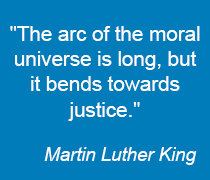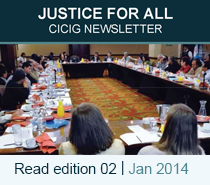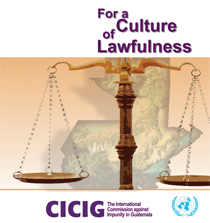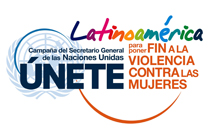 Guatemala, July 6, 2011. What makes a society live in lawfulness? The answer may be the shared responsibility that we, the citizens, have to respect the rule of law. Let us reflect: when individuals do not abide by or respect the law, the places where we live become unsafe, unstable and corrupt.
Guatemala, July 6, 2011. What makes a society live in lawfulness? The answer may be the shared responsibility that we, the citizens, have to respect the rule of law. Let us reflect: when individuals do not abide by or respect the law, the places where we live become unsafe, unstable and corrupt.
By not making an effort to abide by the law, we set a bad to example to other people and the possibility of living in a society with a culture of lawfulness is reduced. Each one of us must take responsibility for constructing a society based on lawfulness, an environment that supports the rule of law, where we can live free of fears and corruption, and where injustice does not prevent the success or development of the country.
The culture of lawfulness is a set of values, perception and attitudes that an individual has towards laws and institutions. In a society where the rule of law prevails, the population must participate in the drafting and implementation of the laws that govern all its individuals and organizations, including the Government.
What is a culture of lawfulness:
- A culture of lawfulness is a set of values, perceptions and attitudes that an individual has towards laws and institutions.
- A civic and school education must be implemented so that the message reaches all sectors of society.
- Government, civil, religious and cultural institutions should all be stakeholders in promoting a culture of lawfulness.
The promotion of this culture should cover everyone. A civic and school education must be implemented so that the message reaches all sectors of society. Simple, direct language should be used to engage youth and motivate cultural change in adults.
Government, religious and cultural institutions should be involved in this task, all of which have vast networks encompassing large segments of the population. Public institutions should create educational programmes for primary, secondary and university education to contribute to the understanding that living in a culture of lawfulness improves quality of life and raises awareness regarding citizens' roles and responsibilities.
On the other hand, NGOs and businesses, among others, can increase societal awareness of the role and responsibility of citizens regarding the laws of a country, as well as demonstrating the manner in which crime and corruption strip a society of cultural values and identity.
Social media also holds an important role in boosting and strengthening lawfulness, highlighting its strengths through publications or broadcasts on the topic and through the communication of truthful, objective information. Furthermore, information should be shared with the public regarding Government and citizens' efforts to implement a culture of lawfulness and programmes should be broadcast evaluating and disseminating the rule of law.
Police institutions should also contribute to educating about the rule of law, setting an example through their actions by not tolerating internal corruption and promoting a culture of lawfulness. Furthermore, citizens should be involved in solving community security problems.
The Palermo experience
Promoting a culture of lawfulness has been successful in cities such as Palermo (Italy) and Medellin (Colombia), where the implementation of educational and cultural programmes, along with the commitment of the whole of society, produced a fall in the high crime levels as well as generating a calm and peaceful environment in which to live.
For decades, Palermo was synonymous with organized crime, corruption and violence. Palermo has become a symbol of rebirth through an extraordinary process involving politicians, civil leaders, members of the Church, local media and authorities to put an end to the violence and intimidation caused by the La Cosa Nostra.
During the seventies and eighties, this criminal group intensified its activities, turning the region into an international thoroughfare for drug trafficking. This led to thousands of people being killed as well as the intimidation and bribery of others. In response to the violence, a civic movement began in the eighties involving lawyers, politicians and priests.
This movement was led by Professor Leoluca Orlando, who later went on to become the Mayor of Palermo. The group staged public meetings where it would speak out against this underground system and it also promoted a culture of lawfulness.
The pressure of this social movement gave journalists and editors the courage to publish information on the critical problems faced by Palermo, leading Government authorities to take action against the
mafia operating in the city.
The mafia responded immediately, murdering dozens of people. However, rather than being intimidated, the citizens of Palmero were emboldened to fight for democracy and freedom. In view of the pressure coming from its people, the Italian Congress passed laws providing for the seizure of mafia assets and stricter prison sentences for members of criminal organizations.
Furthermore, educational programmes were promoted in schools and society, bringing remarkable results: the number of murders in Palermo fell from 240 in 1984 to 3 in 2000. People no longer fear testifying in court in relation to criminal acts, as was the case in the past.
Colombia
In response to high levels of crime in Medellin (Colombia), a culture of lawfulness was implemented, including the passing of laws and educational and cultural programmes to put an end to the insecure, corrupt environment in which its inhabitants lived due to drug trafficking activities. These efforts reduced annual crime levels from 300/year in the nineties to 30/year at present.
Also, as one of the four bases of its national anti-corruption policy, Colombia has included the culture of lawfulness within the curricula of its schools. In 2004, the schooling on the rule of law in Colombia extended pilot programmes implemented in Bogotá and Medellin to include 8 important municipalities across the country.
This programme includes a syllabus that strengthens student capacities with the aim of them taking on the responsibility of building and maintaining a society based on the rule of law. To do so, the syllabus develops a student's cognitive, emotional and communicative competencies, which when joined together facilitate smart conflict resolution and more empathic, pacific, participative, responsible and democratic actions as well as teaching how to appreciate and benefit from individual differences.
The syllabus for a culture of lawfulness was implemented in Colombia by teachers in Bogota and Medellin, under the guidance of the US organization NSIC (National Strategy Information Center). The syllabus includes 36 specially-designed classes for ninth grade students.
Opinion of Guatemalan sectors
According to the representatives of social sectors, the respect for a culture of lawfulness must begin with judges, prosecutors and public officials so that there is an environment of legal certainty.
"Lawfulness does not imply that judges can act with total impunity or that their rulings and judgements are free from being scrutinized; this would only obfuscate and increase the levels of impunity," said Sandino Asturias of the Centre of Guatemalan Studies.
Therefore, he added that lawfulness implies that the justice system operates with complete independence and that the decisions of judges adhere to the law, because justice institutions are responsible for developing and interpreting the legislative framework.
He also said that society must also speak out when these institutions fail to operate within the framework of lawfulness, because only social auditing and the correct actions of justice officials will help to eradicate impunity in the country.
According to Iduvina Hernández, a representative of Security in Democracy, a culture of lawfulness should be fully understood by everyone, including Government officials, and these individuals should fulfill their corresponding obligations.
She added that the State should use educational programmes to increase awareness among the population of the scope of a culture of this type as well as stating that citizens are responsible for transmitting the culture.


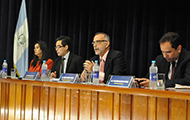
 Guatemala, July 6, 2011. What makes a society live in lawfulness? The answer may be the shared responsibility that we, the citizens, have to respect the rule of law. Let us reflect: when individuals do not abide by or respect the law, the places where we live become unsafe, unstable and corrupt.
Guatemala, July 6, 2011. What makes a society live in lawfulness? The answer may be the shared responsibility that we, the citizens, have to respect the rule of law. Let us reflect: when individuals do not abide by or respect the law, the places where we live become unsafe, unstable and corrupt. 